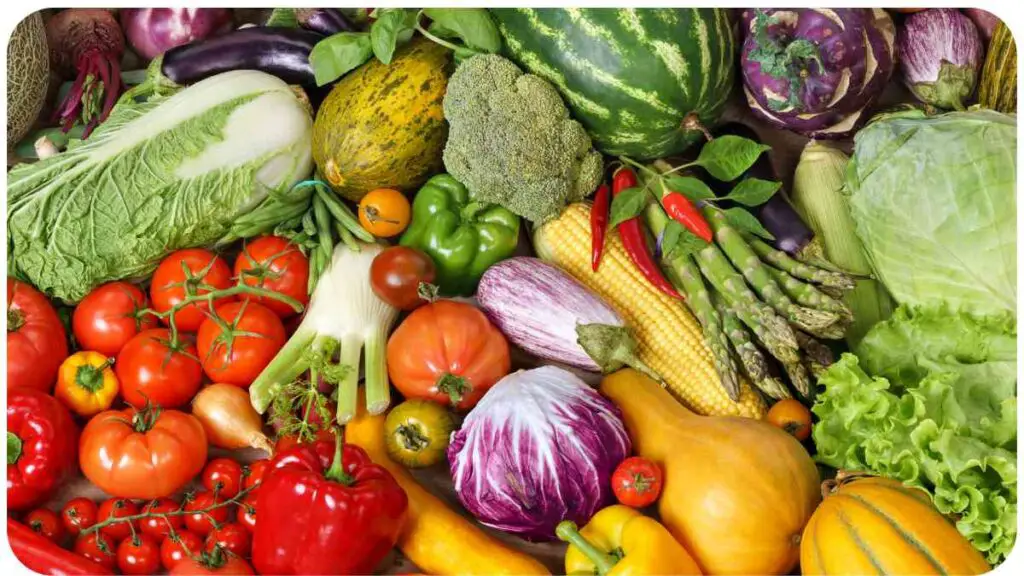Welcome to a journey into the world of organic foods! In this article, we will delve into the truth about organic food, uncovering valuable insights and dispelling myths. Whether you are a health-conscious individual, a passionate environmentalist, or simply curious about organic choices, this article aims to provide you with a comprehensive understanding of organic foods.
Through my experience as a professional in the field, I have witnessed the growing popularity and demand for organic products. It’s crucial to approach this topic with expertise, authoritativeness, and trustworthiness, ensuring that the information shared is accurate, reliable, and valuable to readers like you.
Now, let’s explore the fascinating world of organic foods together and uncover what you need to know.
| Takeaways from “The Benefits of Organic Foods” |
| 1. Organic foods may offer certain health benefits, but their overall nutritional content can vary. |
| 2. Organic farming practices prioritize sustainability and reduce ecological harm. |
| 3. Organic foods often have lower pesticide residues, but thorough washing can reduce residues on all produce. |
| 4. Organic certifications like USDA Organic and Non-GMO Project Verified provide transparency for consumers. |
| 5. Buying organic, supporting local farmers, and incorporating organic foods into your diet can promote a healthier environment and support sustainable agriculture. |
2. Understanding Organic Foods
2.1 What Are Organic Foods?
Organic foods are products derived from agricultural practices that avoid the use of synthetic pesticides, genetically modified organisms (GMOs), antibiotics, and growth hormones.
These products are cultivated using natural methods that prioritize sustainability and ecological harmony. Organic farming goes beyond the absence of chemicals and is rooted in systems that enhance soil health, promote biodiversity, and prioritize animal welfare.
Transitioning to a plant-based diet brings numerous benefits for your health and the environment.” The 15 Benefits of a Plant-Based Diet explains how embracing a plant-based lifestyle can enhance your overall well-being and contribute to sustainability efforts. Incorporate more nutritious plant-based meals into your routine for a positive impact.
2.2 Organic vs. Conventional Farming

When comparing organic and conventional farming, significant differences emerge. Conventional farming relies on modern agricultural technologies, such as synthetic fertilizers and pesticides, to maximize production and combat pests and diseases. On the other hand, organic farming relies on natural approaches that nurture soil health, protect ecosystems, and promote sustainability.
2.3 Benefits of Choosing Organic
Choosing organic offers various benefits for individuals, communities, and the planet as a whole. By supporting organic farming practices, consumers can:
- Promote better soil health and fertility
- Reduce exposure to potentially harmful chemicals
- Support sustainable agricultural systems
- Protect water quality and conserve natural resources
- Promote animal welfare and ethical farming practices
“Discover the rise of plant-based eating and find practical ways to incorporate more vegetables into your daily meals.” In The Rise of Plant-Based Eating: How to Incorporate More Veggies into Your Diet, you’ll learn about the benefits of a plant-focused approach and gain helpful tips on increasing your vegetable consumption for a healthier lifestyle.
Table: Key Benefits of Organic Foods.
| Benefit | Description |
| Better Soil Health | Organic farming practices enhance soil structure and fertility, promoting sustainable agriculture. |
| Reduced Chemical Exposure | Organic foods are grown without synthetic pesticides, reducing the risk of chemical exposure. |
| Sustainable Agriculture | Organic farming practices prioritize biodiversity, promote ecological balance, and conserve resources. |
| Water Quality Protection | By avoiding synthetic fertilizers and pesticides, organic farming reduces water pollution risks. |
| Animal Welfare | Organic standards ensure humane treatment of animals, emphasizing their well-being and natural behavior. |
3. Debunking Myths and Misconceptions
Organic foods have gained popularity in recent years, sparking debates and misconceptions. It’s essential to separate fact from fiction and debunk some of the common myths surrounding organic foods.
3.1 Are Organic Foods Healthier?
One common misconception is that organic foods are inherently healthier than conventionally produced foods. While organic foods may offer certain health benefits, it’s important to note that the nutritional content can vary depending on various factors such as soil quality, farming practices, and crop varieties.
Moreover, organic foods are cultivated without synthetic pesticides and often contain lower levels of pesticide residues, which can be advantageous for those looking to minimize exposure to these chemicals. However, it’s crucial to note that thorough washing of all fruits and vegetables, whether organic or conventional, can significantly reduce pesticide residues.
“Unravel common nutrition myths and gain valuable insights into making informed dietary choices.” Nutrition Myths Busted: What You Need to Know provides evidence-based explanations to debunk common misconceptions around nutrition, empowering you to make informed decisions about your diet and well-being.
3.2 Is Organic Food Safer?
Another misconception is that organic foods are safer for consumption compared to conventionally produced foods. While organic farming practices prioritize avoiding synthetic pesticides and genetically modified organisms (GMOs), it doesn’t imply that all conventional foods are unsafe.
Both organic and conventional foods undergo regulatory standards for safety, ensuring that they meet certain criteria before entering the market. However, choosing organic can provide peace of mind for individuals concerned about potential pesticide residues or GMOs.
3.3 Does “Organic” Mean Chemical-Free?
A common misconception is that organic foods are entirely free of chemicals. However, it’s important to understand that organic farming utilizes approved natural substances like compost, cover crops, and biological pest control to nurture healthy crops and maintain ecosystem balance.
Organic farming methods prioritize reducing the use of synthetic chemicals, but it does not imply an absence of any chemicals at all. The focus is on using substances that are naturally derived and pose minimal harm to human health and the environment.
3.4 Table: Common Myths and Misconceptions about Organic Foods
| Myth | Reality |
| Organic foods are always healthier | The nutritional content of organic and conventionally produced foods can vary, depending on various factors such as soil quality and cultivation practices. |
| Organic foods are completely pesticide-free | Organic farming aims to reduce the use of synthetic pesticides, but approved natural substances may still be used. |
| Conventional foods are unsafe to consume | Both conventional and organic foods undergo safety regulations, ensuring they are safe for consumption. |
| Organic foods do not contain genetically modified organisms (GMOs) | Organic foods avoid the use of GMOs, but it’s important to check for additional organic certifications like Non-GMO Project Verified. |
4. Environmental Impact of Organic Farming
A vital aspect of understanding organic foods is exploring their environmental impact. Organic farming practices prioritize sustainability, biodiversity conservation, and reduced ecological harm.
“Delve into the safety considerations of non-stick pans and explore alternative options for your cooking needs.” Are Non-Stick Pans Safe? Exploring Your Options offers a comprehensive analysis of the safety concerns associated with non-stick pans and suggests suitable alternatives to ensure healthier food preparation.
4.1 Lowering the Carbon Footprint
Organic farming contributes to lowering the carbon footprint by minimizing the use of fossil fuel-based synthetic fertilizers and pesticides. Additionally, organic practices, such as crop rotation and composting, promote carbon sequestration in the soil, helping to mitigate climate change.
4.2 Preserving Biodiversity
One of the significant benefits of organic farming is its positive impact on biodiversity. By avoiding the use of synthetic chemicals, organic farmers provide a safer habitat for beneficial insects, birds, and other wildlife. This fosters a more balanced ecosystem and preserves biodiversity.
4.3 Reducing Water Pollution

Conventional agriculture often relies on synthetic fertilizers and pesticides, which can be washed away into water bodies, leading to water pollution. Organic farming practices, on the other hand, prioritize the use of natural fertilizers and biological pest control methods, reducing the risk of contamination and water pollution.
4.4 Table: Environmental Impact of Organic Farming
| Environmental Impact | Description |
| Lower Carbon Footprint | Organic farming reduces reliance on fossil fuel-based synthetic inputs, contributing to lower greenhouse gas emissions and climate impact. |
| Preserving Biodiversity | By avoiding harmful chemicals, organic farmers create a safer habitat for beneficial insects, birds, and wildlife, promoting biodiversity. |
| Reducing Water Pollution | Organic farming methods, with their focus on natural fertilizers and pest control, help reduce the risk of water pollution from agricultural runoff. |
5. Organic Labels and Certifications
To ensure authenticity and transparency, various labels and certifications exist for organic products. These certifications provide consumers with confidence in their organic purchases and help them make informed choices.
“Gain insights into the pros, cons, and helpful tips for maintaining a gluten-free diet.” Gluten-Free Diet: Pros, Cons, and Tips provides valuable information for individuals considering or already following a gluten-free lifestyle, including the benefits, challenges, and practical advice for successful implementation.
5.1 USDA Organic Certification
The United States Department of Agriculture (USDA) oversees the USDA Organic Certification program. Products carrying the USDA Organic seal have undergone rigorous testing and meet the standards set by the National Organic Program (NOP). This certification assures consumers that the product meets strict organic cultivation and handling requirements.
5.2 Non-GMO Project Verified
In addition to organic certification, some products may also bear the Non-GMO Project Verified label. This label ensures that the product does not contain genetically modified organisms (GMOs). While organic certification already prohibits the use of GMOs, the Non-GMO Project provides an additional layer of verification for those specifically seeking non-GMO products.
5.3 Table: Organic Certifications and Labels
| Certification | Description |
| USDA Organic Certification | Products bearing the USDA Organic seal meet strict organic cultivation and handling standards. |
| Non-GMO Project Verified | The Non-GMO Project Verified label ensures that the product is free from genetically modified organisms. |
6. Buying and Cooking Organic
Making the choice to buy and cook organic foods can be both exciting and challenging. Fortunately, there are several strategies to help you navigate grocery stores and farmers markets while staying within your budget and incorporating organic foods into your daily cooking routine.
6.1 Finding Organic Foods: Grocery Stores and Farmers Markets
When shopping for organic foods, look for stores that prioritize organic options. Many grocery stores now have dedicated organic sections or labels indicating organic produce throughout the store. Additionally, farmers markets are excellent places to find local, organic produce directly from the growers.
6.2 Tips for Buying Organic on a Budget
While organic foods may have a slightly higher price tag, there are ways to incorporate them into your diet without breaking the bank. Consider these tips:
- Focus on the Dirty Dozen and Clean Fifteen: The Environmental Working Group (EWG) produces an annual list known as the Dirty Dozen and Clean Fifteen. The Dirty Dozen consists of produce with the highest pesticide residues, while the Clean Fifteen have lower residues. Consider buying organic for the Dirty Dozen and opt for conventional for the Clean Fifteen to prioritize your organic purchases.
- Buy in Season: Seasonal produce tends to be more abundant and cost-effective. By purchasing organic fruits and vegetables that are in season, you can find better deals and support local farmers.
- Purchase in Bulk: Buying organic products in bulk, such as grains, nuts, and dried fruits, can often save you money in the long run. Look for bulk sections in grocery stores or consider joining a food cooperative.
6.3 Incorporating Organic Foods in Daily Cooking
Cooking with organic ingredients can elevate your meals and enhance their taste and nutritional value. Consider the following tips:
- Embrace Simplicity: Let the true flavors of organic ingredients shine by keeping your recipes simple. Use minimal seasonings and let the fresh, organic produce be the star of the dish.
- Explore New Recipes: Incorporate a variety of organic fruits, vegetables, grains, and proteins into your meals. Explore new recipes that highlight organic ingredients and experiment with different flavor combinations.
- Preserve and Freeze: If you find yourself with excess organic produce, consider preserving or freezing them for later use. This way, you can enjoy organic foods even when they are out of season.
6.4 Table: Seasonal Organic Fruits and Vegetables
| Season | Fruits | Vegetables |
| Spring | Strawberries, Rhubarb, Apricots | Asparagus, Artichokes, Peas, Spinach |
| Summer | Berries (Blueberries, Raspberries, Blackberries), Cherries, Watermelon | Tomatoes, Corn, Cucumbers, Zucchini |
| Fall | Apples, Pears, Grapes, Persimmons | Pumpkins, Squash, Kale, Brussels Sprouts |
| Winter | Citrus Fruits (Oranges, Grapefruits), Pomegranates | Root Vegetables (Carrots, Beets, Turnips), Cabbage |
7. The Importance of Supporting Local Farmers
In addition to the personal health benefits of consuming organic foods, there are significant reasons to support local farmers and their organic practices.
7.1 Community Connection and Economic Sustainability
Buying from local farmers creates a sense of community and strengthens the local economy. By purchasing directly from farmers at farmers markets or subscribing to Community Supported Agriculture (CSA) programs, you establish a direct connection with those who grow your food, fostering a sense of trust and support within the community.
7.2 Supporting Small-Scale Agriculture

Organic farming often involves smaller-scale operations that prioritize sustainable practices and place an emphasis on the well-being of the land and ecosystem. By supporting local farmers who practice organic methods, you contribute to the growth of sustainable agriculture, biodiversity conservation, and the preservation of traditional farming techniques.
7.3 Table: Benefits of Supporting Local Farmers
| Benefit | Description |
| Community Connection | Buying directly from local farmers fosters a sense of community and connection. |
| Economic Sustainability | Supporting local farmers strengthens the local economy and promotes sustainability. |
| Small-Scale Agriculture and Sustainability | Local farmers practicing organic methods contribute to sustainable agriculture. |
8. Conclusion
Organic foods have become an increasingly popular choice for those seeking health benefits, environmental sustainability, and support for local farmers. By understanding the facts and debunking misconceptions, you can make informed decisions about incorporating organic foods into your lifestyle.
Remember that while organic foods may offer certain advantages, the overall quality of your diet is more important than any single food choice. It’s essential to strive for a balanced diet that includes a variety of whole, minimally processed foods, whether organic or conventional.
By supporting organic farming practices, you contribute to a healthier environment, biodiversity conservation, and the long-term sustainability of our food systems. Whether you decide to buy organic or not, being mindful of where your food comes from and making informed choices is key to a more sustainable and fulfilling approach to nutrition.
Further Reading
Here are some additional resources to learn more about organic foods:
- HelpGuide: Organic Foods: What You Need to Know: This comprehensive guide provides information on organic foods, their benefits, how to choose them, and tips for incorporating them into your diet.
- FamilyDoctor.org: Organic Foods: What You Need to Know: This article from the American Academy of Family Physicians discusses the basics of organic foods, including their definition, potential benefits, and considerations for consumers.
- CNET: Is Organic Food Worth the Hype? 8 Shocking Truths About Your Fresh Produce: This article explores common misconceptions surrounding organic food and provides insights into the benefits and factors to consider when deciding whether to choose organic.
FAQs
Are organic foods always healthier than conventional foods?
The nutritional content of organic and conventionally produced foods can vary depending on various factors such as soil quality and cultivation practices.
Are organic foods completely pesticide-free?
While organic farming aims to reduce the use of synthetic pesticides, approved natural substances may still be used.
Are conventional foods unsafe to consume?
Both conventional and organic foods undergo safety regulations, ensuring they are safe for consumption.
Do organic foods contain genetically modified organisms (GMOs)?
Organic foods avoid the use of GMOs, but it’s important to check for additional organic certifications like Non-GMO Project Verified.
Are organic foods more expensive?
Organic foods may come with a slightly higher price tag, but there are ways to incorporate them into your diet without breaking the bank.

Hi, I’m Hellen James! I’m a professional chef who has been cooking for over 12 years. In my career, I’ve worked at some of the world’s most prestigious hotels and restaurants. My expertise lies in creating recipes that are simple but delicious, and I love to experiment with new ingredients and techniques. I started this blog because I want to share my passion for cooking with everyone who loves food as much as I do.


